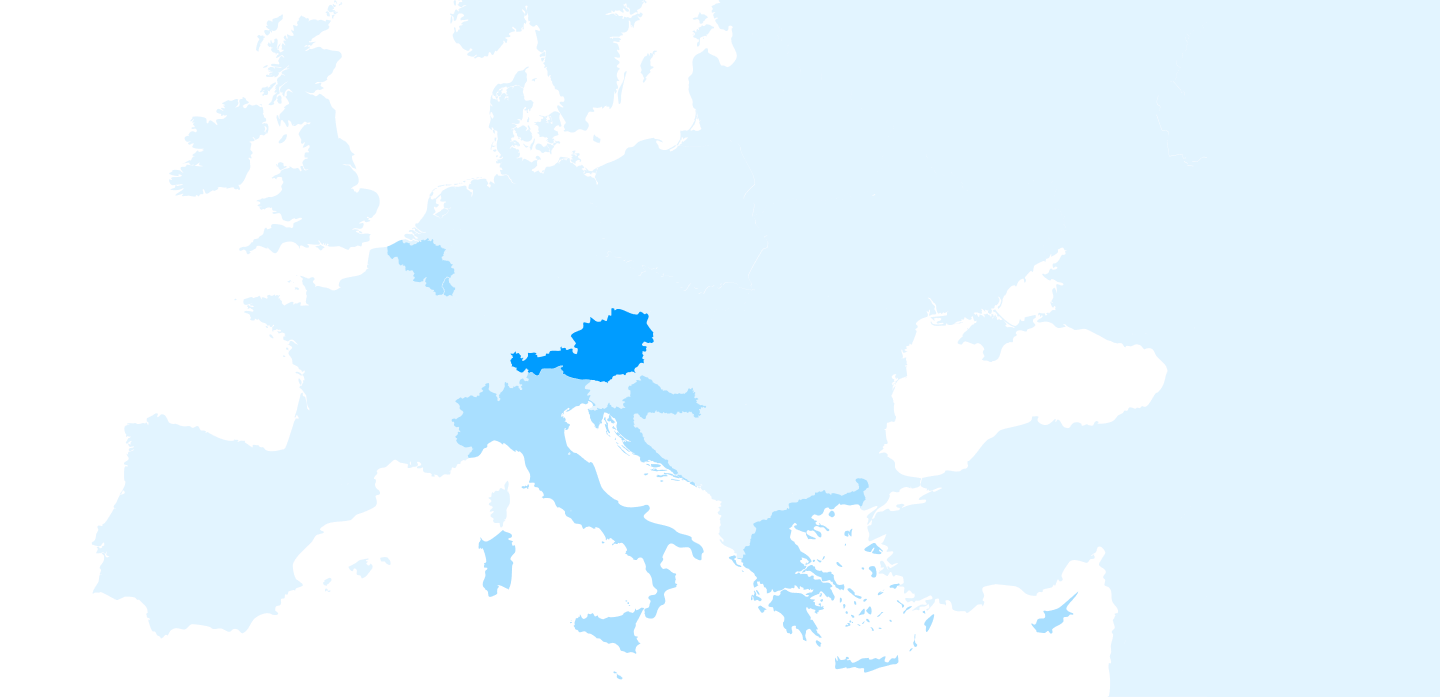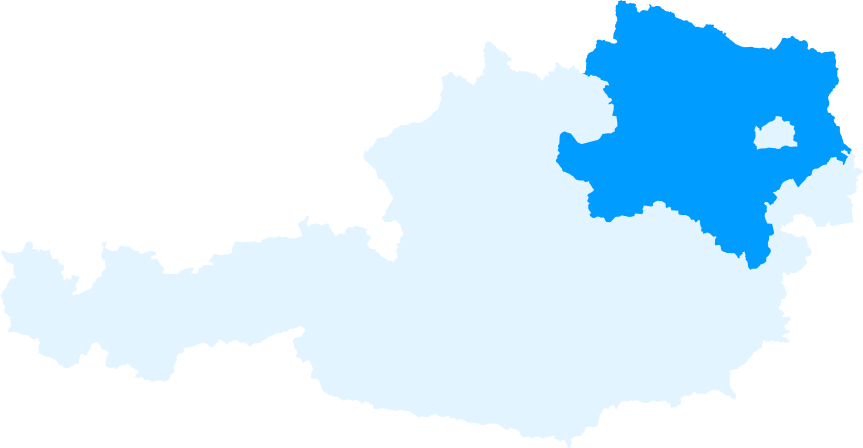Four pilots, one main goal
Pilots
Project implementation involves testing the validity of the IPS Holistic Framework in real environment. Four pilot cases from Austria, Croatia, Greece, and Malta will be the test bed for the Framework with services that represent a different potential interpretation of the IPS Holistic Framework.
The Lower Austrian integrated web-based solution for the Tourism Overnight Stay Tax Service
Set up governance structures to consolidate existing regional geo-spatial infrastructures hence enabling to develop a backbone that will be used to test IPS in areas such as tourism tax collection from 3,200 accommodation providers
- government as a platform
- inclusive, better (and ethical) public service
- mobile communication with apps
- guidance for co-creation
- digital-by-default principle
- user centricity
- sustainability business plan
- process management
- web accessibility directive


Office of the Government of Lower Austria
Austria
Use case problem statement
The intensity and the way ICT and mobile communications are used in the Lower Austrian Regional Government is undergoing radical change. Citizens and other stakeholders have increasing expectations regarding the availability of digital, mobile and location-independent interaction and services that need to be offered by public administrations. Public administration employees also expect to have all necessary information available at any time and any place. Additionally, they need information to be accessible, editable and up-to-date regardless of the end device they use. Whilst media disruptions in general are one of the biggest problems in the digitalisation of public services and processes, particularly the lack of digital integration of geographical information in mobile devices prevents the effective execution of business processes.
The objective of this pilot is to digitally simplify a public service’s workflow and consequently simplify Public Authority (PA) employees‟ and service users‟ everyday work through the use of a web-based solution exploiting geo-spatial data (e.g. tourism tax collection based on the Lower Austrian Tourism Law § 12 NÖ Tourismusgesetz 2010, LGBl. 7400) and mobile communications, in order to provide integrated high-quality services, faster response rates and thus reduce the administrative burden. The mobile-app, that will be co-created with all stakeholders, will recognize the location of the applicant, i.e. the accommodation provider, and subsequently will record the relevant geographical data indicating the location of the service-user.

Use Case Definition & Design
Public Service Consumers (Beneficiaries): 3,200 accommodation providers in Lower Austria.
AS-IS: When tourists pay a fee to the accommodation provider for each overnight stay the fee includes a tourism tax. The accommodation provider has to pay this tax to the local council on a monthly basis, that then has to pay a part of it to the regional government (Lower Austrian Regional Government). The local municipality keeps 35% of the tax, 65% is paid to the Regional Government of Lower Austria. There are 537 local councils in Lower Austria (in German, “Gemeinden”) that receive data from 3,200 accommodation providers. Currently, the necessary data is submitted using Excel forms, that is then manually read and re-entered by public employees. This might lead to (human) errors such as wrong numbers and locations, requires human resources allocation, and may even result in wrong financial transactions.

Lower Austria
TO-BE (Co-created Integrated PS description)
In order to address this problem, the pilot will reuse inGov co-creation platform and IPS governance models to co- create a micro app based on geo-information. The micro-app could therefore: be used independently of location and of the type of device used; increase safety; be simple and understandable to use; be adapted to the Regional Government‟s workflow; be agile and adaptable; provide machine-readable data (derived from application form, e.g. location of accommodation, date of application, type of tax, etc.) in real time.
With the integrated web-based solution, the citizen continues to pay the tourist tax together with the hotel fee, but subsequently the accommodation provider will use the micro-app to fill out the necessary form. The geo-location functionality will automatically pre-fill part of this form with relevant information, such as the name of the local council that will collect the tax, location of accommodation, date of application, type of tax, etc., so that the accommodation provider will have less information to enter. Furthermore, the data will be transferred in a structured format to a database instead of being sent via Excel forms that is re-entered manually. In addition, the data can then be also forwarded to other stakeholders such as the Lower Austrian Tourism Authority.
Stakeholders of IPS co-creation: (a) businesses (the hotel/accommodation providers), (b) the local council, (c) the Regional Government of Lower Austria (in particular, the Department WST3), (d) the Lower Austrian Tourism authority and (e) six regional tourism authorities.
Data sets to be used: The data to be used stems from the use of micro-app e.g. location of accommodation, date of application, type of tax, etc. Currently there are no relevant registries that can be used to streamline this service. Existing models: In this pilot, the following inGov results will be utilised: the inGov IPS co-creation models along the inGov IPS co-creation governance models (roadmap, organisational models, guidelines).
Possible Obstacles: (a) Resistance to change, (b) lack of feedback and co-creation (design, development) engagement. Reusability: The results of the pilot can be reused for the development of similar web-based micro-apps exploiting.

Reusability
Solutions to be explored/developed in the project: In the Lower Austrian pilot we will reuse inGov co-creation platform and IPS governance models to set up governance structures in order to co-create an integrated web-based solution exploiting geo-spatial data (e.g. tourism tax collection based on the Lower Austrian Tourism Law § 12 NÖ Tourismusgesetz 2010, LGBl. 7400) and mobile communications.
The integrated web-based solution represents a new, process-oriented and cross-organizational view: Starting with an analysis of the existing Geographical Information System (GIS), the pilot aims to either improve the existing structure or develop new ones. In the framework of this pilot, a web-based integrated solution for geo-information-based systems is envisaged. This will ensure the development of a range of micro apps such as the tourism tax collection solution of this pilot. The information and data gained from the micro-app would flow into the WST3 departments‟ management systems, i.e. the LAKIS management system (Lower Austrian Government electronic file management system) and accounting system, as well as the Lower Austrian Tourism Authority‟s system, via API. The data flows from and to the databases will be handled via defined or standardized interfaces. This integrative approach makes it possible to provide new application developments or adaptations much faster than is possible in a classical GIS application. Furthermore, the use of the sensor technology that is available in mobile devices (GPS, camera, compass, orientation in space, etc.) enables a simpler and higher quality information acquisition than is currently possible. Accessible Mobile technologies necessity: Mobile phones are used by the majority of the service-users and thus are suitable channels for public service delivery. The implementation of the Web Accessibility Directive will be supported by enhanced cooperation on digital accessibility between various stakeholders. This will result in scalable and more affordable accessibility solutions, as well as empowering all service-users in an inclusive way.
IPS co-creation governance necessity: In the framework of this pilot project, a micro-app will be implemented. Testing the process requires several actors from the Regional Government, especially those departments which already have databases with usable interfaces. Additionally, in order to increase the acceptance of the web-app that will be developed and ensure its usability and adoption, co-creation with all stakeholders will be necessary during the designing of the micro-app.